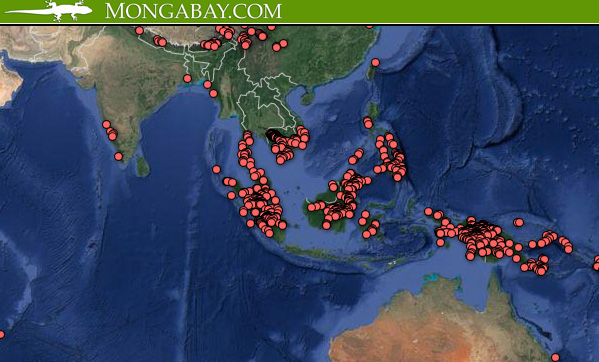 A global deforestation tracking tool developed by Mongabay and NASA has been honored as a Finalist for the 2013 Katerva Award.
A global deforestation tracking tool developed by Mongabay and NASA has been honored as a Finalist for the 2013 Katerva Award.
“It is a surprise and an incredible honor to be selected as a finalist for the Katerva Award,” said Mongabay.org founder Rhett A. Butler. “We’d like to thank Dr. Christopher Potter and his colleagues at NASA for their work in developing this powerful tool.”
Mongabay was recognized for its Global Forest Disturbance Alert System (GloF-DAS), which was developed in partnership with the Carnegie-Ames-Stanford Approach (CASA) ecosystem modeling team at NASA Ames Research Center. The system helps users detect deforestation shortly after it occurs, offering the potential to take measures to investigate clearing before it expands.
GloF-DAS relies on NASA’s Quarterly Indicator of Cover Change (QUICC), a MODIS satellite-based product that detect changes in forest greenness cover relative to the year-earlier period. It registers change in all forest and woodland areas that have lost at least 40 percent of their green vegetation cover over the past year. Seasonal variation is generally mitigated through the product’s quarterly baseline, although changes in some parts of the world, like boreal regions, can be affected by snow and ice distribution.
The tool can help highlight areas where deforestation and forest degradation is occurring on a quarterly basis, potentially providing insight to authorities, policymakers, civil society, local communities, and academics.
The Katerva prize
Founded in 2010, The Katerva Prize, which has been called “the Nobel Prize of Sustainability”, honors the most innovative projects from around the globe on an annual basis. Winners are selected by a panel of experts.
“To solve the complex sustainability challenges we face as stewards of our planet, will require innovative solutions across a wide range of disciplines and economic sectors. Katerva provides a much needed and novel forum for this to happen, as evidenced by the Finalists for the Katerva Award,” said Antonio J. Busalacchi, Jr, Director of the Earth System Science Interdisciplinary Center (ESSIC) and Professor in the Department of Atmospheric and Oceanic Science at the University of Maryland, USA.
“Katerva is not just interested in ‘good’ ideas; the ideas we are after will create big changes in how we live on this planet,” added Katerva’s founder, innovation expert Terry Waghorn. “Katerva’s approach places emphasis squarely on action for a sustainable future—creating and implementing solutions to sustainability-related concerns.”
Katerva also offers a People’s Choice Award enabling the public to vote on what it views as the most innovative project. Voting is open through March 28 at the Katerva website. Mongabay is in the running for the award.